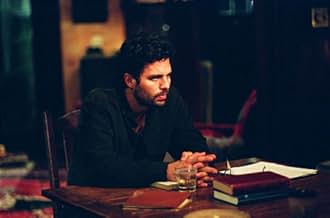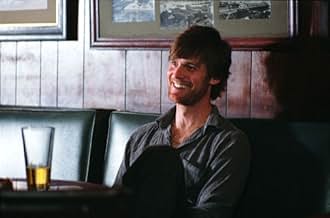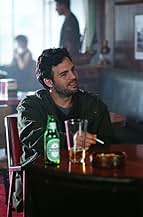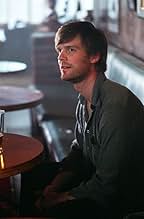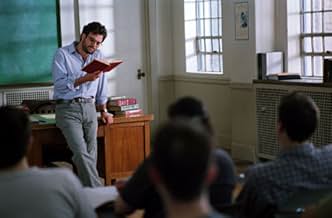CALIFICACIÓN DE IMDb
6.2/10
10 k
TU CALIFICACIÓN
Una indiscreción entre dos amigos íntimos destruye sus respectivos matrimonios.Una indiscreción entre dos amigos íntimos destruye sus respectivos matrimonios.Una indiscreción entre dos amigos íntimos destruye sus respectivos matrimonios.
- Dirección
- Guionistas
- Elenco
- Premios
- 2 premios ganados y 4 nominaciones en total
- Dirección
- Guionistas
- Todo el elenco y el equipo
- Producción, taquilla y más en IMDbPro
Opiniones destacadas
An ernest dose of claustrophobia
We Don't Live Here Anymore begins with two couples having a semi drunken party. At least Terry (Laura Dern), Jack's wife, is getting drunk, a thing she does pretty often. They've run out of beer and Jack (Mark Ruffalo) and Edith (Naomi Watts), who's the wife of Hank (Peter Krause) go to get some. Later that night the first fight occurs between Jack and Terry. This isn't the first time Jack has run off with Edith on little improvised errands and they've come to make Terry suspicious -- and she's right: Edith and Jack are soon getting it on outside on a blanket. The two couples' lives are intertwined. Jack and Hank work in the same college English department, Jack teaching literature and Hank creative writing, an activity at which he is not a success, though acceptance of one of his poems by The New Yorker is one of the few positive and non-adulterous events in the movie. The two men also go out on runs together -- sweaty, huffy, ridiculously competitive and un-fun slogs on deserted roads, followed by a beer at a pub. Edith and Jack continue to sneak off to have sex, Terry remains suspicious, and Hank doesn't seem to care either about Edith or about anybody but himself and his unsuccess, though being a habitual philanderer often on the prowl (mostly for girl students), he eventually he scares up some lust for Terry, who's eager for that kind of revenge once she knows what Jack is up to.
There's no question about the fact that Ruffalo, Watts, Dern, and Krause do their best to flesh out what, by the film's end, still appear to be rather undefined roles underwritten and equally unsimpatico. There's no doubt about Terry's volatility and anger and Edith's cool withdrawal and intense need. Hank is laid back and self absorbed, and in one of his typically complex portrayals of a ne'er-do-well, Mark Ruffalo as Jack combines needy, querulous, hostile, and sexy with a resultingly vivid but unappealing effect -- which one could also say for Laura Dern's energetic and committed portrayal. The actors do interesting (if somewhat unrewarding) work; they're better than the material. So are the designer, who's composed wonderful interiors, and the cinematographer, who has made them translucent and real. But this is a drama so focused on adultery that the adultery itself remains incompletely described as an experience. Where's the guilt? Where's the excitement? We Don't Live Here Anymore has too little to say about anything else in life other than the mechanisms of infidelity including the way children get caught in the crossfire. Though there is plenty of drinking and some smoking (Edith and Jack indulge in the latter secret vice after their secret sex sessions), the characters don't even seem to have time to sit down and eat and there's only the most smarmy and limited depiction of the men at work in the classroom, or their offices. For men and women of intelligence, these people show little brains and wit.
The friend I saw this movie with dwelt on the retro nature of the women's roles. This is a serious flaw because there's been no effort to show that the story material is from the Seventies. It's unlikely, perhaps nearly impossible, for two assistant professors at a college in the northwest nowadays to both have wives who do nothing but cook, clean house, and mind the kids. This is just one indication of a certain clumsiness in the story adaptations that are also slim on motivation and personality. We Don't Live Here Anymore is only a `good' movie in the sense that it's a grownup treatment of a grownup theme with a certain polish and a talented cast. But it's extremely claustrophobic without the compensation one might find in Bergman, say, of a growing intensity, of leaving one with powerful emotions. Jack and Terry and Hank and Edith may sputter and lash at one another at times, but they don't seem to know about or care about themselves or each other enough to make the viewer care too.
It's hard to describe the action, which slides from scene to scene gratuitously slipping in a shot or two from another scene, such as Jack and Edith's first sex outdoors, or cutting back and forth from one couple and house to the other. Do we have to have that? Why not do one thing at a time? This is where I love the French linear clarity of Eric Rohmer. He takes one conversation at a time. No slippery flash cut peeks at other people during a conversation. Sure, Eric Rohmer's cinema is a highly formalized version of life. But what is We Don't Live Here Anymore? All these things are artificial. There are no climaxes, and there's neither passion nor brilliance. One can't help thinking of the excitement, both emotional and intellectual, aroused by a good production of Who's Afraid of Virginia Wolf, beside which We Don't Live Here Anymore almost seems to slink away in shame. And compared to the lighthearted stimulation of watching an Eric Rohmer film, this one is more like taking a dose of castor oil.
We Don't Live Here Anymore begins with two couples having a semi drunken party. At least Terry (Laura Dern), Jack's wife, is getting drunk, a thing she does pretty often. They've run out of beer and Jack (Mark Ruffalo) and Edith (Naomi Watts), who's the wife of Hank (Peter Krause) go to get some. Later that night the first fight occurs between Jack and Terry. This isn't the first time Jack has run off with Edith on little improvised errands and they've come to make Terry suspicious -- and she's right: Edith and Jack are soon getting it on outside on a blanket. The two couples' lives are intertwined. Jack and Hank work in the same college English department, Jack teaching literature and Hank creative writing, an activity at which he is not a success, though acceptance of one of his poems by The New Yorker is one of the few positive and non-adulterous events in the movie. The two men also go out on runs together -- sweaty, huffy, ridiculously competitive and un-fun slogs on deserted roads, followed by a beer at a pub. Edith and Jack continue to sneak off to have sex, Terry remains suspicious, and Hank doesn't seem to care either about Edith or about anybody but himself and his unsuccess, though being a habitual philanderer often on the prowl (mostly for girl students), he eventually he scares up some lust for Terry, who's eager for that kind of revenge once she knows what Jack is up to.
There's no question about the fact that Ruffalo, Watts, Dern, and Krause do their best to flesh out what, by the film's end, still appear to be rather undefined roles underwritten and equally unsimpatico. There's no doubt about Terry's volatility and anger and Edith's cool withdrawal and intense need. Hank is laid back and self absorbed, and in one of his typically complex portrayals of a ne'er-do-well, Mark Ruffalo as Jack combines needy, querulous, hostile, and sexy with a resultingly vivid but unappealing effect -- which one could also say for Laura Dern's energetic and committed portrayal. The actors do interesting (if somewhat unrewarding) work; they're better than the material. So are the designer, who's composed wonderful interiors, and the cinematographer, who has made them translucent and real. But this is a drama so focused on adultery that the adultery itself remains incompletely described as an experience. Where's the guilt? Where's the excitement? We Don't Live Here Anymore has too little to say about anything else in life other than the mechanisms of infidelity including the way children get caught in the crossfire. Though there is plenty of drinking and some smoking (Edith and Jack indulge in the latter secret vice after their secret sex sessions), the characters don't even seem to have time to sit down and eat and there's only the most smarmy and limited depiction of the men at work in the classroom, or their offices. For men and women of intelligence, these people show little brains and wit.
The friend I saw this movie with dwelt on the retro nature of the women's roles. This is a serious flaw because there's been no effort to show that the story material is from the Seventies. It's unlikely, perhaps nearly impossible, for two assistant professors at a college in the northwest nowadays to both have wives who do nothing but cook, clean house, and mind the kids. This is just one indication of a certain clumsiness in the story adaptations that are also slim on motivation and personality. We Don't Live Here Anymore is only a `good' movie in the sense that it's a grownup treatment of a grownup theme with a certain polish and a talented cast. But it's extremely claustrophobic without the compensation one might find in Bergman, say, of a growing intensity, of leaving one with powerful emotions. Jack and Terry and Hank and Edith may sputter and lash at one another at times, but they don't seem to know about or care about themselves or each other enough to make the viewer care too.
It's hard to describe the action, which slides from scene to scene gratuitously slipping in a shot or two from another scene, such as Jack and Edith's first sex outdoors, or cutting back and forth from one couple and house to the other. Do we have to have that? Why not do one thing at a time? This is where I love the French linear clarity of Eric Rohmer. He takes one conversation at a time. No slippery flash cut peeks at other people during a conversation. Sure, Eric Rohmer's cinema is a highly formalized version of life. But what is We Don't Live Here Anymore? All these things are artificial. There are no climaxes, and there's neither passion nor brilliance. One can't help thinking of the excitement, both emotional and intellectual, aroused by a good production of Who's Afraid of Virginia Wolf, beside which We Don't Live Here Anymore almost seems to slink away in shame. And compared to the lighthearted stimulation of watching an Eric Rohmer film, this one is more like taking a dose of castor oil.
John Curran presents a very unsettling view on fragile relationships. At the centre of the story there are two married couples and from their interactions one can easily conclude that there was once a lot of love within the couples and a strong friendship between them and now, well in the case of Hank and Edith, the love is vanishing into thin air. Edith still yearns for Hank's love but Hank is too self-absorbed in his self-perceived failure and careless about his wife's infidelity. Terry still deeply loves Jack who is going through a mid-life crisis (like Hank) and finds comfort, both sexual and emotional, with Edith. At the center of their relationships are the children of the respective couples who are the most vulnerable ones. The film is a shocking portrayal of relationships and friendships that have reached a stage where indifference, obligation, guilt, loneliness and despair take over. Curran also adds some doses of humour that is subtle and welcoming (at the same time non-intrusive).
The cinematography is fantastic and editing is wonderful. I especially liked how the camera jumps from one character to another, showing what they are going through, during a constant time period. The score contributes to the gloominess but in a non-intrusive and non-melodramatic way. It is rather gentle and flowing smoothly.
'We Don't Live Here Anymore' showcases four exceptional performances. Ruffalo is both hateful and sympathetic as Jack. The remarkable Laura Dern is explosive and fiery as Terry. Her Terry is the strongest of the four and Dern is both gripping and haunting. Both Ruffalo and Dern benefit from well-defined roles (but even otherwise they are great actors as has been evident in their other movies) though there was the risk that had the roles been played by lesser actors, they could have easily become caricatures. However, the characters Hank and Edith depend more on the actor's performances. Naomi Watts shows immense depth through a wonderfully restrained performance while Peter Krause brilliantly downplays and brings a rawness to his part and his facial expressions speak volumes.
'We Don't Live Here Anymore' is certainly not a positive look at relationships. The friendship between the couple is strong and there is an understanding between them that shows that they care for each other. Notice in the later scene when Dern's Terry tries to comfort Watts's Edith and the chats between Hank and Jack are proof enough. Even though the words aren't said, they only know each other too well and maybe it is respect that is losing its hold and probably friendship will too. Curran's film tells a meaningful raw story that is honest, brutal, daring and unsympathetic to its characters.
The cinematography is fantastic and editing is wonderful. I especially liked how the camera jumps from one character to another, showing what they are going through, during a constant time period. The score contributes to the gloominess but in a non-intrusive and non-melodramatic way. It is rather gentle and flowing smoothly.
'We Don't Live Here Anymore' showcases four exceptional performances. Ruffalo is both hateful and sympathetic as Jack. The remarkable Laura Dern is explosive and fiery as Terry. Her Terry is the strongest of the four and Dern is both gripping and haunting. Both Ruffalo and Dern benefit from well-defined roles (but even otherwise they are great actors as has been evident in their other movies) though there was the risk that had the roles been played by lesser actors, they could have easily become caricatures. However, the characters Hank and Edith depend more on the actor's performances. Naomi Watts shows immense depth through a wonderfully restrained performance while Peter Krause brilliantly downplays and brings a rawness to his part and his facial expressions speak volumes.
'We Don't Live Here Anymore' is certainly not a positive look at relationships. The friendship between the couple is strong and there is an understanding between them that shows that they care for each other. Notice in the later scene when Dern's Terry tries to comfort Watts's Edith and the chats between Hank and Jack are proof enough. Even though the words aren't said, they only know each other too well and maybe it is respect that is losing its hold and probably friendship will too. Curran's film tells a meaningful raw story that is honest, brutal, daring and unsympathetic to its characters.
Not a heart-wrenching film but illuminates with precision the dynamics of friendship, marriage and adultery. It shows a potent portrait of two couples whose marriages are going to break; has an enormous power and tells some uncomfortable truths. In this movie actions have consequences that are not resolved with a hug or a cry. The four grown-ups (as well as their children who are perfectly aware of the situation) are very talented and all deliver passionate and compulsive performances. The atmosphere lingering in the air is what impressed me the most, being the flick filled with very expressive glances and electrical silences. Mark Ruffalo and Naomi Watts always very gifted.
Watch this as a double-bill with Mike Nichols' "Closer," and you very well might swear off love, relationships and marriage for a very long time, if not forever.
The last screenwriter I'd expect to write a somber, almost Bergmanesque exploration of marriage and infidelity would be Larry Gross, whose credits include "48 HRS." (1982) and "Streets of Fire" 1984) for Walter Hill and "True Crime" (1999) for Clint Eastwood.
Yet Gross has turned two Andre Dubus short stories into an engaging, albeit somewhat depressing, movie that explores marital infidelities among two couples - Jack (Mark Ruffalo) and Terry Linden (Laura Dern); and Hank (Peter Krause) and Edith Evans (Naomi Watts).
Much like the Nichols film, "We Don't Live Here Anymore" can be tough viewing, at times. Uncomfortable, even occasionally painful. But the actors make it work, often lifting it above trite moments. Director John Curran keeps things tight and gets emotionally powerful performances from them. Though, the film would have smarted more had Krause injected some rawness into his role. Hank seems too laid-back about the whole affair and Krause's performance never inches past insouciant.
Dern throws herself fully into her strongest role since "Citizen Ruth" (1996). As a wife who's apparently lost the desire of her husband and really has little interest in housework, Dern does well to keep Terry from turning into a broad caricature. She makes Terry sad without turning her pathetic. A bedroom confrontation with Jack doesn't veer into clichés only because Dern and Ruffalo bring such brutal honesty to their roles.
Watts seems to revel in playing emotionally devastated women. Here, she throws in selfishness, to boot. Watts makes it awfully difficult for us to like Edith because she's the most manipulative of the lot. That we wind up caring about her speaks highly of Watts' acting ability.
The Lindens and the Evanses might very well take narcissism to a new level. These thoroughly self-absorbed people don't really care about the infidelity. In fact, they're so blasé about it all, you wonder if anything at all would jolt them into feeling something for someone else.
When Edith asks Jack, "How do you think we'll get caught?" she's not so much worried about her husband finding about the affair than her friend, Terry. And it's in delving into the Terry-Edith dynamic that Gross' script fails. We hear that these two women are dearest friends. Yet, we never get that feeling from watching them together. In fact, Gross never really gives either Dern or Watts, two incredible talents, the chance to play off each other. Their few scenes together barely scratch the surface of any friendship Terry and Edith might have.
True, there's nothing really sympathetic about any of these four people. I doubt redemption's around the corner, either. But the way they claw at each other's emotions, occasionally fraying themselves, as they lie and cheat, and even tell the truth, to their loved ones, makes for compelling viewing.
"We Don't Live Here Anymore" shows a side of marriage that movies, certainly American movies, rarely dare to depict. Marriage isn't easy. For many, it can be terribly hard work. Sometimes, painful and difficult work. And that's what this film shows.
You can't really say you enjoyed watching this movie, but it will linger with you long after you're done watching it; when you're stuck washing dirty dishes for the umpteenth time, picking up tossed-about laundry or suddenly realizing that your lover's quirk which you once thought was endearing and cute is now just positively irritating and infuriating.
The last screenwriter I'd expect to write a somber, almost Bergmanesque exploration of marriage and infidelity would be Larry Gross, whose credits include "48 HRS." (1982) and "Streets of Fire" 1984) for Walter Hill and "True Crime" (1999) for Clint Eastwood.
Yet Gross has turned two Andre Dubus short stories into an engaging, albeit somewhat depressing, movie that explores marital infidelities among two couples - Jack (Mark Ruffalo) and Terry Linden (Laura Dern); and Hank (Peter Krause) and Edith Evans (Naomi Watts).
Much like the Nichols film, "We Don't Live Here Anymore" can be tough viewing, at times. Uncomfortable, even occasionally painful. But the actors make it work, often lifting it above trite moments. Director John Curran keeps things tight and gets emotionally powerful performances from them. Though, the film would have smarted more had Krause injected some rawness into his role. Hank seems too laid-back about the whole affair and Krause's performance never inches past insouciant.
Dern throws herself fully into her strongest role since "Citizen Ruth" (1996). As a wife who's apparently lost the desire of her husband and really has little interest in housework, Dern does well to keep Terry from turning into a broad caricature. She makes Terry sad without turning her pathetic. A bedroom confrontation with Jack doesn't veer into clichés only because Dern and Ruffalo bring such brutal honesty to their roles.
Watts seems to revel in playing emotionally devastated women. Here, she throws in selfishness, to boot. Watts makes it awfully difficult for us to like Edith because she's the most manipulative of the lot. That we wind up caring about her speaks highly of Watts' acting ability.
The Lindens and the Evanses might very well take narcissism to a new level. These thoroughly self-absorbed people don't really care about the infidelity. In fact, they're so blasé about it all, you wonder if anything at all would jolt them into feeling something for someone else.
When Edith asks Jack, "How do you think we'll get caught?" she's not so much worried about her husband finding about the affair than her friend, Terry. And it's in delving into the Terry-Edith dynamic that Gross' script fails. We hear that these two women are dearest friends. Yet, we never get that feeling from watching them together. In fact, Gross never really gives either Dern or Watts, two incredible talents, the chance to play off each other. Their few scenes together barely scratch the surface of any friendship Terry and Edith might have.
True, there's nothing really sympathetic about any of these four people. I doubt redemption's around the corner, either. But the way they claw at each other's emotions, occasionally fraying themselves, as they lie and cheat, and even tell the truth, to their loved ones, makes for compelling viewing.
"We Don't Live Here Anymore" shows a side of marriage that movies, certainly American movies, rarely dare to depict. Marriage isn't easy. For many, it can be terribly hard work. Sometimes, painful and difficult work. And that's what this film shows.
You can't really say you enjoyed watching this movie, but it will linger with you long after you're done watching it; when you're stuck washing dirty dishes for the umpteenth time, picking up tossed-about laundry or suddenly realizing that your lover's quirk which you once thought was endearing and cute is now just positively irritating and infuriating.
There was a Bergmanesque quality to "We Don't Live Here Any More," recalling the passionate stories and deep psychological insights into characters in the films of the Swedish auteur filmmaker. Like Bergman, director John Curran offered a sensitive touch to the film's deliberate style of pacing and the still moments where the characters seemed lost in thought.
The story of "We Don't Live Here Any More" focuses on two married couples in adulterous relationships. The physical environments helped to convey the essence of how mismatched the individual characters were in their marriages. The characters of Jack (Mark Ruffalo) and Edith (Naomi Watts) would have seemed much more at home in the cheerful and immaculate house. By contrast, Hank (Peter Krause) and Terry (Laura Dern) would have found a better fit in the cluttered, bohemian-style home. All four performances were moving and believable. From the film's opening scene, it was easy to see how the characters were propelled to one another.
This was not a perfect film. It would have been more true to life to focus on the emotional layers of characterization instead of the sex. For the most part, the four characters seemed like good parents, and it was difficult to imagine where they would find the time to set up their trysts and be away from home for protracted periods. The genius of Bergman was to tap into those deep layers of emotional pain, which seemed remarkably absent in this film. Instead of heading out into the forest or into the car, it would have been revealing to learn more about the characters' feelings in their own homes and in their own words.
Still, after viewing "We Don't Live Here Anymore," I found myself reflecting on the characters and the relationships many days later. And that is a sign of a good film!
The story of "We Don't Live Here Any More" focuses on two married couples in adulterous relationships. The physical environments helped to convey the essence of how mismatched the individual characters were in their marriages. The characters of Jack (Mark Ruffalo) and Edith (Naomi Watts) would have seemed much more at home in the cheerful and immaculate house. By contrast, Hank (Peter Krause) and Terry (Laura Dern) would have found a better fit in the cluttered, bohemian-style home. All four performances were moving and believable. From the film's opening scene, it was easy to see how the characters were propelled to one another.
This was not a perfect film. It would have been more true to life to focus on the emotional layers of characterization instead of the sex. For the most part, the four characters seemed like good parents, and it was difficult to imagine where they would find the time to set up their trysts and be away from home for protracted periods. The genius of Bergman was to tap into those deep layers of emotional pain, which seemed remarkably absent in this film. Instead of heading out into the forest or into the car, it would have been revealing to learn more about the characters' feelings in their own homes and in their own words.
Still, after viewing "We Don't Live Here Anymore," I found myself reflecting on the characters and the relationships many days later. And that is a sign of a good film!
¿Sabías que…?
- TriviaThe Irish step dance scene starts with a cutaway where the center dancer is actually a male dancer.
- Citas
[last lines]
Edith Evans: I'm not leaving you because you're unfaith Hank, I'm leaving because I was.
Hank Evans: Look, none of that matters any more. It's over. Isn't it? Isn't it, Edith?
Edith Evans: Yeah. It's over.
Hank Evans: Well then, why leave now?
Edith Evans: Because I can.
- Créditos curiososSpecial Thanks To Christine & Ben Christine, Terry & Kelly Kris & Fisher
- ConexionesFeatured in The 20th IFP Independent Spirit Awards (2005)
- Bandas sonorasJungle Warrior
Written by John Otieno
Performed by Matata
Courtesy of President Records Ltd. UK
Selecciones populares
Inicia sesión para calificar y agrega a la lista de videos para obtener recomendaciones personalizadas
- How long is We Don't Live Here Anymore?Con tecnología de Alexa
Detalles
- Fecha de lanzamiento
- Países de origen
- Sitios oficiales
- Idioma
- También se conoce como
- We Don't Live Here Anymore
- Locaciones de filmación
- Productoras
- Ver más créditos de la compañía en IMDbPro
Taquilla
- Presupuesto
- USD 3,000,000 (estimado)
- Total en EE. UU. y Canadá
- USD 2,041,014
- Fin de semana de estreno en EE. UU. y Canadá
- USD 101,295
- 15 ago 2004
- Total a nivel mundial
- USD 3,361,213
- Tiempo de ejecución
- 1h 41min(101 min)
- Color
- Mezcla de sonido
- Relación de aspecto
- 2.35 : 1
Contribuir a esta página
Sugiere una edición o agrega el contenido que falta


